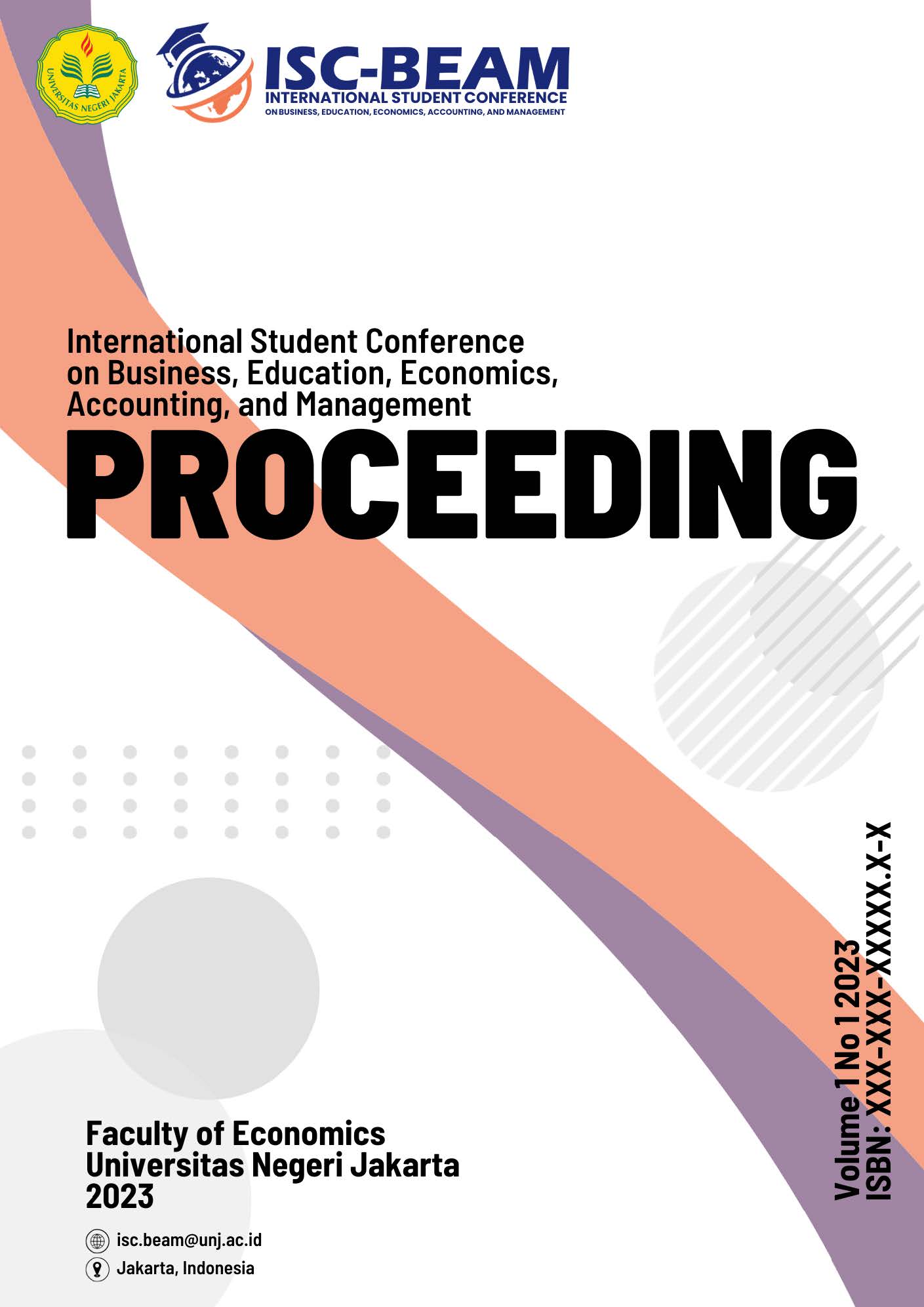The Influence of User Factors on AI and User Experience in the Lazada
DOI:
https://doi.org/10.21009/ISC-BEAM.011.25Keywords:
user security, user satisfaction, retention, application of AI, user experienceAbstract
This research reviews specific problems in considering how much influence the factors of user data security, user satisfaction, user retention, application of artificial intelligence (AI) and impact on user experience. The goal is to provide useful guidance for app developers and e-commerce business owners to improve User Experience and integrate AI effectively. This research is included in Quantitative study by distribute questionnaires online to Lazada application users. The aim is to understand user views of Lazada application services. And these factors have a significant role in maintaining competitiveness and improving applications. And the research concludes that user data security and user retention factors have worthy of attention on applications of artificial intelligence and user experience. However, user experience with the application of artificial intelligence (AI) and user experience have an insignificant influence.
References
Aggarwal, K., et al. (2022). Has the future started? The current growth of artificial intelligence, machine learning, and deep learning. Iraqi Journal for Computer Science and Mathematics, 3(1), 115-123.
Arpah, M., & Nabella, S. D. (2023). The Effect of Trust, Perception of Risk and Security on Consumer Purchase Interest in Lazada (Empirical Study on Students of The Faculty of Economics and Business, Ibn Sina University). International Journal of Accounting, Management, Economics and Social Sciences (IJAMESC), 1(4), 304-316.
Azzahra, T. R., & Kusumawati, N. (2023). The Impact of Mobile Service Quality, Perceived Value, Perceived Usefulness, Perceived Ease of Use, Customer Satisfaction Towards Continuance Intention to Use MyTelkomsel App. Journal of Consumer Studies and AppliedMarketing, 1(1), 46-60.
Berni, A., & Borgianni, Y. (2021). From the definition of user experience to a framework to classify its applications in design. Proceedings of the Design Society, 1, 1627-1636.
Chen, C. W., & Demirci, S. (2019). Factors affecting mobile shoppers’ continuation intention of coffee shop online store: A perspective on consumer tolerance. International Journal of Electronic Commerce Studies, 10(2), 203-238.
Chen, T., Guo, W., Gao, X., & Liang, Z. (2021). AI-based self-service technology in public service delivery: User experience and influencing factors. Government Information Quarterly, 38(4), 101520.
El-Sherif, D. M., Abouzid, M., Elzarif, M. T., Ahmed, A. A., Albakri, A., & Alshehri, M. M. (2022, February). Telehealth and Artificial Intelligence insights into healthcare during the COVID-19 pandemic. In Healthcare (Vol. 10, No. 2, p. 385). MDPI.
García-Estela, A., Cantillo, J., Angarita-Osorio, N., Mur-Milà, E., Anmella, G., Pérez, V., ... & Colom, F. (2022). Real-world implementation of a smartphone-based psychoeducation program for bipolar disorder: observational ecological study. Journal of Medical Internet Research, 24(2), e31565.
Hakim, M. F., Anhar, M., & Sampurna, D. S. (2021). The Influence of Work Motivation, Work Discipline and Work Environment on Job Satisfaction. Indonesian Journal of Business, Accounting and Management, 4(01), 20-27.
Hassani, H., Silva, E. S., Unger, S., TajMazinani, M., & Mac Feely, S. (2020). Artificial intelligence (AI) or intelligence augmentation (IA): what is the future?. Ai, 1(2), 8.
Kanade, A., Bhoite, S., Kanade, S., & Jain, N. (2023). Artificial Intelligence and Morality: A Social Responsibility. Journal of Intelligence Studies in Business, 13(1), 65-75.
Kivimaa, P., Brisbois, M. C., Jayaram, D., Hakala, E., & Siddi, M. (2022). A socio-technical lens on security in sustainability transitions: Future expectations for positive and negative security. Futures, 141, 102971.
Lewis, J. R., & Sauro, J. (2021). Usability and user experience: Design and evaluation. Handbook of Human Factors and Ergonomics, 972-1015.
Lin, Y. H., Chen, S. Y., Lin, P. H., Tai, A. S., Pan, Y. C., Hsieh, C. E., & Lin, S. H. (2020). Assessing user retention of a mobile app: survival analysis. JMIR mHealth and uHealth, 8(11), e16309.
Munir, M., & Darmawan, D. (2022). The Role of Trust, Ease of Use and Security on Shopping Interests at Lazada. Engineering and Technology International Journal, 4(03), 135-145.
Nathaniel, B. A., Christiana, A. O., & Olanrewaju, F. E. (2019). USABILITY EVALUATON OF USERS'EXPERIENCE ON SOME EXISTING E-COMMERCE PLATFORMS. Library Philosophy and Practice, 1-17.
Norrahman, R. A., & Badruddin, B. (2023). THE EFFECT OF USING ARTIFICIAL INTELLIGENCE ON CUSTOMER TRUST ON SHARIA BANK SERVICES IN INDONESIA. IERJ Islamic Economics Review Journal, 2(2), 56-65.
Oladimeji, K. A., & Abdulkareem, A. K. (2023). An Assessment of User Satisfaction with E-Police in Nigeria. RUDN Journal of Public Administration, 10(1), 130-143.
Saputra, A., & Tentama, F. (2020). Construction of the subjective well-being scale. International Journal of Scientific and Technology Research, 9(2), 38-42.
Sauer, J., Sonderegger, A., & Schmutz, S. (2020). Usability, user experience and accessibility: towards an integrative model. Ergonomics, 63(10), 1207-1220.
Shao, C., & Kwon, K. H. (2021). Hello Alexa! Exploring effects of motivational factors and social presence on satisfaction with artificial intelligence‐enabled gadgets. Human Behavior and Emerging Technologies, 3(5), 978-988.
Xu, F., & Du, J. T. (2019). Examining differences and similarities between graduate and undergraduate students' user satisfaction with digital libraries. The Journal of Academic Librarianship, 45(6), 102072.
Yigitcanlar, T., & Cugurullo, F. (2020). The sustainability of artificial intelligence: An urbanistic viewpoint from the lens of smart and sustainable cities. Sustainability, 12(20), 8548.
Yoon, S., & Kim, M. (2023). A Study on the Improvement Direction of Artificial Intelligence Speakers Applying DeLone and McLean’s Information System Success Model. Human Behavior and Emerging Technologies, 2023.
Zakaria, M. H., & Boer, R. F. (2022). The Effect of the Implementation of “Veronika” Virtual Assistant Chatbot on Customer Experience and Satisfaction in Using Telkomsel Service. Budapest International Research and Critics Institute-Journal (BIRCI-Journal), 5(4), 29196-29208.
Zhang, H.; Hu, L. Dispel the Clouds and See the Sun: Influencing Factors and Multiple Path of User Retention Intention Formation. Preprints 2023, 2023071345. https://doi.org/10.20944/preprints202307.1345.v1






